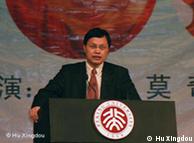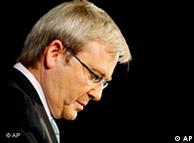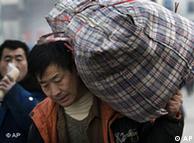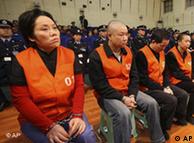As China Rises, Fears Grow on Whether Boom Can Endure
BEIJING — As much of the world struggles to clamber out of a serious recession, a gradual flow of economic power from West to East has turned into a flood.
New high points, it seems, are reached daily. China surged past the United States to become the world’s largest automobile market — in units, if not in dollars, figures released Monday show. It also toppled Germany as the biggest exporter of manufactured goods, according to year-end trade data. World Bank estimates suggest that China — the world’s fifth-largest economy four years ago — will shortly overtake Japan to claim the No. 2 spot.
The shift of economic gravity to China has occurred partly because growth here remained robust even as the world’s developed economies suffered the steepest drop in trade and economic output in decades.
But that did not happen by chance: China’s decisive government intervention in the economy, combined with the defiant optimism of its companies and consumers, has propelled an economy that until recently had seemed tethered to the health of its major export markets, including the United States.
Beijing’s state-run news media, indulging in a moment of self-congratulation, have hailed China’s new economic prominence as proof of national superiority.
The country’s economic miracle, the newspaper People’s Daily boasted last week, exists because its leaders — unlike those in other, unnamed nations — can make quick decisions and ensure underlings carry them out. The Great Recession, the newspaper said, has laid bare cracks in plodding Western-style capitalism.
Yet China confronts a number of challenges about its recent surge, including whether its formula for growth is sustainable, and how it will manage its increasingly strained economic relations with the outside world. Those are likely to prove challenging issues for a leadership unaccustomed to making policy under an international spotlight.
Sustaining a global-size economy is nowhere near as simple as building one, some Chinese and Western economists say. As the Chinese navigate toward a bigger role in the world financial system, they are already running into diplomatic and political headwinds.
At home, ordinary citizens and economists alike worry that the government’s decision to flood the economy with cash has created speculative bubbles — in housing, in lending — that could burst with disastrous effect. But curbing speculation requires moves, such as raising interest rates, that could crimp the sprees of investment and industrial expansion that are the main contributors to growth.
Abroad, the pressure on China to revalue its currency, the renminbi, is strengthening, and it seems sure to intensify after trade statistics released Sunday showed that China’s yearlong downturn in export growth reversed in December. Keeping the renminbi fixed at a low rate against the dollar boosts China’s exports and its economy. But increasingly, it angers its trade partners.
China once could wave off complaints about its currency policies, arguing that it was a developing nation entitled to a bit of slack from its Western customers. But with the world’s fastest-growing economy — and more than $2 trillion in foreign reserves — that argument looks increasingly untenable.
“At a time when you’ve got 10 percent unemployment in the U.S. and a very slow and gradual global recovery — and China seems to be skyrocketing — the pressure on the Chinese to change some of these policies, including the exchange-rate policy, is really going to grow this year,” said Nicholas Consonery, a China analyst at Eurasia Group, a New York-based political risk research firm.
In theory, China’s growing economic clout should benefit everyone: in an interconnected world, growing trade creates jobs and money everywhere.
“China’s extremely important, no doubt about it. And over all, the more important China becomes, the better it is for the American economy,” Scott Kennedy, who heads the Research Center for Chinese Politics and Business at Indiana University, said in an interview.
That Shanghai-assembled iPod, Mr. Kennedy said, is the product of American research and design and marketing, and most of the proceeds from its sale go back into American coffers. But China’s rise also poses new risks both for Beijing and for its trading partners.
Its largely bruise-free journey through last year’s economic crisis aside, not everyone is convinced that Beijing has eliminated threats to its financial and economic health.
Hit hard by an initial drop in exports that was frighteningly steep for a leadership that has long promised and delivered fast growth, China poured $585 billion in stimulus money into its domestic economy. Officials also ordered state-run banks to increase their lending by double that amount, triggering a spree of easy money that created jobs for migrant factory workers and fueled rises in the price of assets, like stocks and real estate.
Some experts fear that too much of the stimulus money was put into unprofitable projects and bad loans that will be exposed in a few years. In that view, China’s 2009 boom, in which automakers sold nearly 14 million cars and trucks, and housing prices doubled, is really a sign of an overheated economy at risk of serious recession down the road.
Judged by the numbers, China’s economy still looks robust. In Beijing, officials said, per capita gross domestic product is expected to exceed $4,000 this year, a 10 percent jump from 2009. Last month, the value of China’s exports leaped by nearly a third over the same month in 2008 — and imports jumped 55 percent, pointing toward growth in manufacturing.
But a Chinese economic crisis, which could have been shrugged off a few years ago, would be a considerably more serious event in a world in which Beijing runs the second-largest economy.
The government appears concerned. Last week, the central bank edged up the rate on an often-watched interbank loan, the first such hike in five months. That seemed to signal concern that the economy was expanding too quickly.
Many experts see few signs of immediate danger. After all, they note, China has gone on splurges before — building too many steel mills, and too many office buildings — only to see the nation’s breakneck growth sop up the excess capacity. With nearly a billion people still clawing to advance beyond peasant status, they say, China’s growth story has many chapters ahead.
Mr. Kennedy, the Indiana University expert, said he was less certain that endless growth is such a panacea. “No one defies economic laws,” he said. “Eventually you get it, whether you want it or not.”
****
New Investment Tools Approved by Regulator in China
SHANGHAI — China took a major step Friday toward making its capital market system more sophisticated and perhaps more stable as it agreed to give investors a new and powerful set of risk-management tools.
The government said it had approved, “in principle,” the creation of stock index futures, trading on margin and short selling, investment tools that are commonly used in New York, Chicago, London and many other financial markets, according to Xinhua, China’s state run news agency.
The announcement means that for the first time investors in China have more options than simply buying and selling their favorite stocks. They will soon be able to invest in a stock index (or set of stocks, collectively) and borrow money to trade stocks on margin.
Investors will also be able to make financial bets that stock prices will fall, a practice called short selling.
“This is a major step for China’s capital markets,” said Chang Chun, a professor of finance at the China Europe International Business School in Shanghai. “The government has been studying this for a long time.”
The China Securities Regulatory Commission said on its Web site Friday that it may take three months to complete preparations for the new investing tools to become available.
“This improves the stability and the healthy development of the capital markets,” the C.S.R.C. said in its statement.
By approving the new tools, the government hopes to accomplish several goals, including giving Shanghai more credibility as a financial capital and encouraging more ordinary Chinese to invest in equity markets. Many households still keep a large amount of their savings in low-interest accounts at state banks.
The announcement Friday did not come as a surprise to investors here.
Rumors that such an announcement was imminent have excited market players in recent days.
They drove up the share prices of Chinese brokerage houses, which expect to cash in on the new rules by making margin loans to investors and giving them additional options to hedge their risk.
Jing Ulrich, chairman of China Equities and Commodities at JP Morgan, said in a report released late Friday that the new investment tools will help institutional investors who want to hedge and reduce volatility in a market that is known for wild price swings.
Mainland China’s benchmark Shanghai Composite index almost doubled in 2007, then slumped 65 percent in 2008 before rebounding about 80 percent last year.
The government has been eager to offer investors additional tools for some time.
In 2006, Beijing established the China Financial Futures Exchange in Shanghai. Since then, regulators have been testing stock index futures, short selling and margin trading.
But regulators delayed approving the practices because of the global financial crisis and because of worries that such trading could disrupt the country’s volatile stock exchanges in Shanghai and Shenzhen, analysts say.
The Chinese government has worried that short selling and trading on margin in particular could be abused by investors and increase speculation and chaos in the market.
Short selling and derivatives trading have come under sharp scrutiny in the United States and elsewhere, because of similar worries about whether they improve or distort markets. In 2008, the United States and other countries imposed a temporary ban on short selling of financial stocks. The bans were lifted after several months.
The Shanghai and Shenzhen exchanges only began to take shape in the early 1990s, when Beijing pushed to develop a financial market system. Exchanges in Hong Kong, a former British territory that reverted to Chinese control in 1997, have long had such offerings, because they operate independently of Beijing.
Now, Shanghai is eager to establish itself as a financial center that can compete with Hong Kong, and even New York. The city is building a huge financial center in the Pudong district, trying to lure Wall Street executives and giving private equity firms incentives to establish offices here.
| 以言治罪不仅突破文明底线,而且颠覆共和国宪法 | ||||
 | 中国著名知识分子刘晓波被判处11年有期徒刑, [更多] | |||
| 力拓案结束调查 澳方密切关注 | ||||
 | 历经半年多时间,力拓间谍案于本周一结束调查, [更多] | |||



沒有留言:
張貼留言